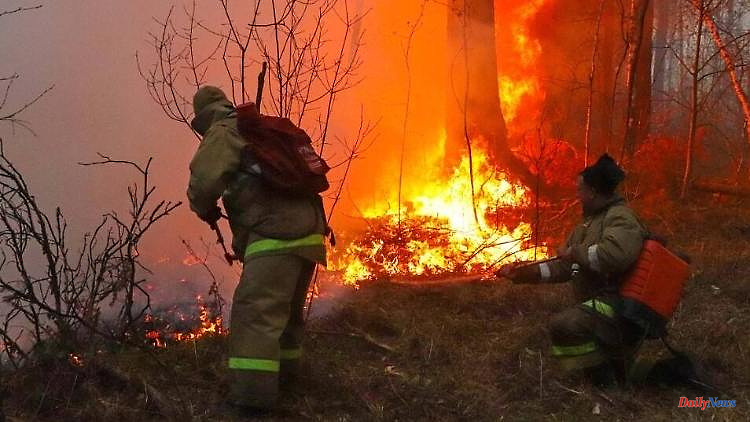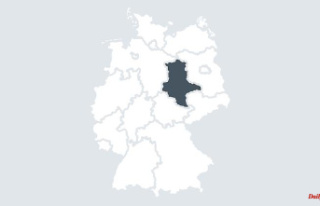In Russia, thousands of fires are blazing across huge areas, and forests are also on fire. This year, the fires could be worse than usual, a fire ecologist fears. The fact that the Russian soldiers are not there to extinguish the fire is not the reason.
Millions of hectares of forest burn in Russia every year. It is not uncommon for large areas to be on fire in the spring. When the snow disappears, the fires in Siberia and western Russia start in fields, grasslands and in forests.
At the moment, however, more and more regions in Siberia are reporting severe forest fires and are having problems fighting them. According to the Russian government, there have already been 4,000 individual fires this year. Hundreds of houses were destroyed and at least 16 people died in the flames. In the Krasnoyarsk region alone, around 1,000 hectares of forest and steppe are burning.
More areas are on fire this year than in 2021, observes Johann Georg Goldammer in the ntv podcast "Learned again". He is head of the Global Fire Monitoring Center at the Max Planck Institute for Chemistry at the University of Freiburg. "In the space between the Urals and the Central Asian part of Russia, there is roughly a million hectares of land that has been affected by fires. But only a small proportion of that is forest, about a quarter of the number of fires observed by satellites. "
This is still within the norm, according to Goldammer. "Of course, this can develop further during the year if there is a lack of precipitation. If it continues to be extremely dry, then we can get fires like we saw in Siberia last year."
Last year, 18.2 million hectares of forest and steppe were burned in Russia. This year more than 5 million hectares are already burning or burned, says Greenpeace Russia. And the fires are starting earlier than usual. The timing is bad. Some media had reported that Russia could not keep up with the firefighting because the soldiers were missing. They are currently deployed because of Russia's war of aggression in Ukraine. However, Johann Georg Goldammer describes such reports as misleading. "The army has nothing to do with fighting forest fires." She doesn't know anything about it and doesn't take care of the evacuation, he reports. The army will only be called in in emergencies.
The fire economist explains that two major players are responsible for preventing and fighting forest fires in Russia. Once there is the forest administration. "It used to be organized centrally, but has been decentralized for a number of years due to Russian forest legislation. Responsibility lies with the regions."
If the forest fires escalate and the forestry companies get stuck extinguishing them, the Russian Ministry of Disaster Management EMERCOM will help. "With helicopters and fire-fighting aircraft, hardly any ground personnel, but really only with this additional technical equipment. This is a partnership that has developed over many decades in Russia and which has worked well so far and kept the fires within a range that has been average for decades met," reports Johann Georg Goldammer.
There is no fire brigade in Russia like the one we know from Germany, with many volunteer fire brigades in rural areas. Altogether, around 1.2 million firemen work there, just a little more than in Germany. And the Russian fire brigade only has around half as many vehicles, according to the fire statistics of the World Fire Brigade Association. Russia is the largest country on earth, almost 50 times the size of Germany. And also the one with the most forests. Large parts of the country are not inhabited, there are no roads or rails in the regions - which does not make firefighting any easier.
The forest fires in Russia have several causes. Most wildfires - 72 percent - are caused by humans, according to a 2011 WWF study. In northern Russia, where not many people live, lightning strikes are the most common cause of fire (50 to 70 percent).
When farmers burn the remains of their harvest in the fields in spring and late summer, these fires also spread to forests and dry grassy areas. Although this is the cheapest method, it is not helpful in the long term, says Johann Georg Goldammer in the podcast. "The biomass belongs in the soil. It should form humus there, enrich the soil again. If we have this burning of harvest residues for years and decades, then it is associated with long-term soil degradation."
The Russian forest fires not only kill people and destroy entire villages. They also affect the climate. Every year, millions of tons of carbon and other pollutants enter the earth's atmosphere. Also, the fire is thawing the permanently frozen ground - the permafrost - that covers two-thirds of Russia. As a result, dead plant remains in the soil decompose and the carbon is released into the air as a greenhouse gas.
Goldammer says it's not yet possible to say whether it will really be as bad as some fear. "What the balance sheets look like at the end is only decided after a few years, when you observe the regeneration process of these areas, whether the forest will come back with the same old vitality. That's what it usually did in the past," says the fire expert. Because: "When the forest fully regenerates, it absorbs all the carbon again."
Apparently, Russia can no longer keep up with forest firefighting. In Siberia, inmates and guards from a prison have had to help put it out. The fact that it is getting hotter and drier makes it easy for the fire. The climate changes mainly in the very north, including in the Siberian taiga. "Then the fires burn a little longer, hotter and more intensely," says Goldammer, "and of course that worries us."
6












